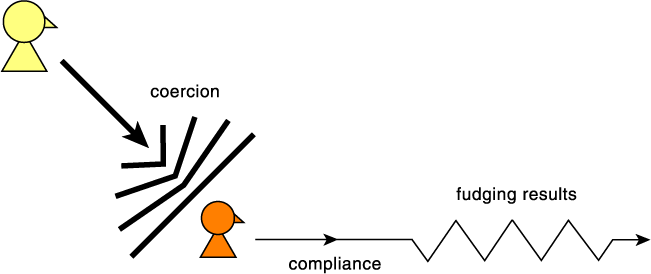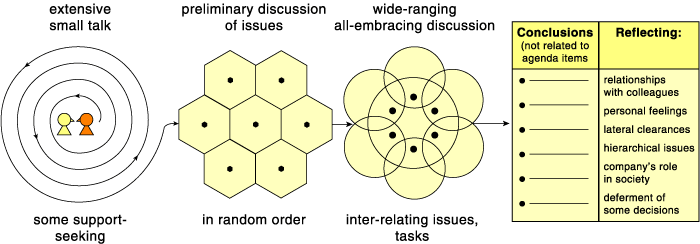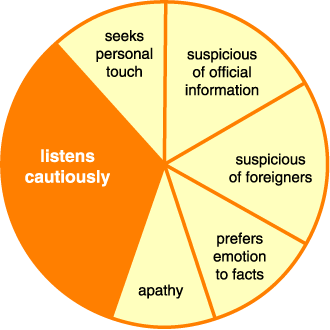Culture: interactionConcept of statusIn Russia this has varied according to the historical period. In Tsarist times the Royal Family as well as large numbers of nobles, dukes, princes etc. were highly visible. From 1917 to 1988 there was a Communist hierarchy. Less obvious, but nevertheless important throughout modern Russian history, is the status attributed to writers, scientists and dignitaries of the Russian Orthodox Church (1000 years of authority).
Gender issuesOften abused at home by drunken husbands, there is little equality in social life. In rural areas, and some times in the cities, women are seen to be engaged in heavy physical tasks - it is however possible for women to be upwardly mobile politically and many have achieved high ranking positions in the Party. Nowadays women entrepreneurs are slowly emerging. Women greatly outnumber men due to war deaths and early male mortality through alcoholism. Russian women are strong-willed but modest. Female networks have helped them through hard times.
Leadership styleThe leadership concept is undergoing profound changes in Russia following the demise of the Soviet Communist state. Efforts made by managers to promote business through official channels only are likely to founder on the rocks of bureaucracy and Russian apathy. Using key people and personal alliances, the “system” is often by-passed and a result achieved.
 Language of management
Language of managementNigel Holden sees Russian, where social distance is encoded in highly subtle ways, as resembling Japanese as a flexible management language in network mode. Soviet managers were involved little in such areas as leadership or motivation of employees. The management style utilised threats and coercion to produce results demanded by socialist ‘planning’. How Russian will develop as a language of management in the future will depend on modes of address using names and titles and the development of formal and informal mechanisms which do not remind subordinates of coercion and control.
 Motivation factors
Motivation factors Russians love children more than most of us; exchange of photographs of your children is an excellent manner to build bridges.
They respect old people and scorn Americans’ treatment of the elderly. In the cruel Russian environment, family love was often the only enduring form of riches. Display your own family closeness, if appropriate.
If you have strong cards, do not overplay them. Russians are proud people and must not be humiliated.
They are people rather than deal-oriented. Try to make them like you.
One way to succeed is to conspire with them ‘to beat the system’. They dislike stringent regulations more than you do. They are very Italian in this respect.
Indicate your own distrust of blind authority or excessive bureaucracy as often as you can.
Do them a favour early on, but indicate it is not out of weakness. The favour should be person-directed, rather than related to the business being discussed.
You need not be unduly impacted by their theatrical and emotional displays, but you should show sympathy with the human aspects involved.
When you show your own firmness, let some glimmer of kindness shine through.
They will generally behave collectively, so do not single out any one individual for special attention. Envy of another’s success is also a Russian characteristic.
Drink with them between meetings if you are able to. It is one of the easiest ways to build bridges.
They prefer to drink sitting down, with time to make frequent toasts and short speeches.
They like praise, especially related to Russian advances in technology, but also about their considerable artistic achievements.
Take every opportunity to indicate your human side – emotions, hopes, aspirations, etc. They are much more interested in your personal goals than in your commercial objectives.
During your business discussions, their priorities will be personal relationships, form and appearance, opportunity for financial gain – in that order.
They have, in their history, never experienced democracy. Therefore, do not expect them to be automatically egalitarian, fair, even-handed and open to straight debate.
In this respect, it is advisable to show them clearly how you think about such matters and how you are basically motivated by these factors.
Terms such as ‘democratic’, ‘fair-play’, ‘profit’, ‘turnover’, ‘cash flow’, ‘public relations’, ‘goodwill’ have little meaning for them in any language, therefore use such words cautiously.
They like to say they understand when in fact they don’t, and also have the tendency to say things they think you want to hear (an Oriental trait), so do not take what is said for granted.
Anything you introduce as an official directive or regulation they will distrust. Something you indicate as a personal recommendation, they will embrace.
Excessive profits are often looked upon as illegitimate. Don’t be greedy, either for yourself or for them.
Russians are basically conservative and do not accept change easily. Introduce new ideas slowly and keep them low key at first.
Russians often push you and understand being pushed, but they rebel if they feel the pressure is intolerable. Try to gauge how far you can go with them.
Dissidence, in general, is not popular with them, as security has historically been found in group, conformist behaviour. Do not try to separate a Russian from his or her ‘group’, whatever that may be.
They love conversation. Do not hesitate to unburden yourself in front of them. Like Germans, they are fond of soul-searching.
General behaviour at meetingsRussians are good chess players and plan several moves ahead. They anticipate many of your reactions and are better prepared than they seem. They respect strength and firmness, will appear tough if you show willingness to retreat or compromise, will retreat themselves if you are tough. They will “sit out” deadlock situations with great patience. At meetings they speak with one voice. Their initial demands are often high and may appear unreasonable or over-ambitious. This is a tactic. They prefer the other side to speak first. (reactive characteristic). Suspicious of ‘easy’ business (in Soviet times everything was complicated).
The atmosphere at Russian meetings depends very much on the context. In Soviet times one was engaged in long-drawn out, cautious discussions with frequently intransigent civil servants. Russians of all categories know how to blow hot and cold and can be theatrically verbose as well as icily tight-lipped. In the current fluid situation Russian entrepreneurs are opportunistic and of many ethnic backgrounds (Armenians and Georgians are ubiquitous) and while they are more flexible than state officials, they are unlikely to be very accommodating and conduct negotiations in ‘chess tempo’.

Key to Diagram
Multi-active people are not happy with the bullet point approach, which they see as premature conclusions reached by their linear colleagues. They prefer to take points in random order (or in order of importance) and discuss them for hours before listing bullet points as conclusions. When they see them at the beginning they feel they have been manipulated.
Negotiating characteristics Russian negotiating teams are often composed of veterans or experts, consequently they are very experienced.
They negotiate as they play chess, i.e. they plan several moves ahead. Opponents should think of the consequences of each move before making it.
Russians often represent not themselves, but part of their government at some level.
Sudden changes or new ideas cause discomfort, as they have to seek consensus from higher up.
Negotiations often relate the subject under discussion to other issues in which they are involved. This may not be clear to the other side.
Russians regard willingness to compromise as a sign of weakness.
Their preferred tactic in case of deadlock is to display patience and “sit it out”.
They will only abandon this tactic if the other side shows great firmness.
The general tendency is to push forward vigorously as the other side seems to retreat, to pull back when meeting stiff resistance.
Delivery style is often theatrical and emotional, intended to convey clearly their intent and requests.
Like Americans, they can use “tough talk” if they think they are in a stronger position.
They maintain discipline in the meeting and speak with one voice. When Americans or Italians speak with several voices, the Russians become confused about who has real authority.
Russians often present an initial draft outlining all their objectives. This is only their starting position and far from what they expect to achieve.
They will, however, concede points only in return for concessions made by the other side.
They often make minor concessions and ask for major ones in return.
They may build into their initial draft several “throw-aways” – things of little importance which they can concede freely, without damaging their own position.
They usually ask the other side to speak first, so they may reflect on the position given.
They are sensitive and status conscious and must be treated as equals and not “talked down to”.
Their approach to an agreement is conceptual and all-embracing, as opposed to American or German step-by-step settlement.
Acceptance of their conceptual approach often leads to difficulties in working out details later and eventual implementation.
They are suspicious of anything which is conceded easily. In the Soviet Union days, everything was complex.
Personal relationships between the negotiating teams can often achieve miracles in cases of apparent official deadlock.
Contracts are not so binding in the Russian mind as in the Western. Like orientals, Russians see a contract as binding only if it continues to be mutually beneficial.
A study of the above leads one to the conclusion that Russian negotiators are not easy people to deal with. We have no reason to believe that the development of entrepreneurism in Russia, giving added opportunities and greater breadth of vision to those who travel in the West, will make Russians any less effective round the negotiating table. Westerners may hold strong cards and may be able to dictate conditions for some length of time, but the ultimate mutual goal of win-win negotiations will only be achieved through adaptation to current Russian mentality and world attitudes.
Contracts and commitmentsIn Soviet times, the wheels of officialdom turned slowly, but, as most business was done with government agencies, contracts were generally guaranteed and adhered to. In the present economic turmoil with hundreds of thousands of new “entrepreneurs” at large, prudence is essential in making contracts. Fraud is common and one has to be aware of possible Mafia interference. There is low legal consciousness in Russia and parliament changes laws, or makes new laws, in exchange for monetary considerations Tax, company and property law is fragile.
Manners and taboos Toasting. A serious business. Hosts toast first. Then guests according to rank. Short speech - poetic or dramatic. Sentimental.
Drink while seated. Russians are uncomfortable at standing cocktail parties.
Taboos include:
– wearing coats indoors (pyjamas OK in hotel corridor!)
– hands in pants pockets
– sitting with legs wide apart
– lunching on park lawns in city
– whistling in street
– public displays of affection
– saying you’re going to the toilet
Touching another person is a sign of confidence.
Russians begin conversations unsmiling (like Germans), then talk at great length in roundabout manner.
Russians don’t come on time for appointments, or discuss business until 10 in the morning.
Russians oriented towards thinking. Americans towards acting. After conference ends, Russians sit up all night reflecting on day’s events. Americans plan for next day.
Russians don’t answer other people’s telephones.
How to empathize with them They are not as interested in money as you are, therefore they are more prepared to walk away from a deal than you.
You may base your decisions on facts which are cold to you, emotive to them.
They are sensitive about war talk, considering most Russian wars as defensive ones against aggressive neighbours. They have not been given your version of history.
Their attitude towards America is one of suspicion, tinged with outright admiration.
They often appear excitable, but are skilled at keeping their temper.
The Eastern and Western elements in their make-up often make them appear schizophrenic. Do not let this faze you – the other face will always reappear in due course.
It remains to be seen to what extent they will become risk-takers in a free market environment.
Right and wrong, in most Russians’ eyes, is decided by the feelings of the majority, not by law.
Russians are essentially nostalgic – the present does not dominate their thinking as it might with many Americans and Australians, for instance.
They achieve what they achieve in their own country largely through an intricate network of personal relationships. Favour is repaid by favour. They expect no help from officials.
Like Germans, they enter meetings unsmiling. Like Germans, they can be quickly melted down with a show of understanding and sincerity.
When they touch another person during conversation, it is a sign of confidence.
Russian values are essentially human, their heroes universally authentic, their manifestations and symbols richly artistic and aesthetic. To succeed with Russians, one must maintain these qualities in clear focus as opposed to paying too much attention to the enigmatic and often paradoxical aspects of their behaviour and current attitudes.









